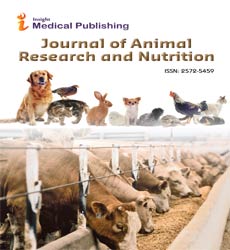Abstract
Effect of supplementing essential oils on the in vitro methane production and digestibility of wheat straw
The study was taken up to assess the effect of the pure essential oils (EOs) viz. cinnamaldehyde, carvacrol, carvone and limonene supplemented individually at 1 to 5% levels of the substrate DM (wheat straw) on the in vitro methane production and fiber degradation in a 4 × 7 factorial design. Supplementation of cinnamaldehyde and carvon, irrespective of their level had significantly (P < 0.01) higher net gas production (NGP), digestibility of neutral detergent fiber (NDFD) and true organic matter (TOMD), metabolizable energy (ME) availability and volatile fatty acids (VFAs) production from the substrate. The methane production was lowest (P < 0.01) in carvacrol followed by limonene and highest (P < 0.01) in carvone supplemented groups. Irrespective of the type of EO, the NGP and ME availability at 1% level of supplementation was comparable with control, while values of all other parameters were significantly (P < 0.01) lower than control and positive control. The NGP, NDFD and TOMD, ME availability, methane production and total and individual VFAs production was depressed significantly (P < 0.01) beyond 1% level of supplementation of EO. It was concluded that carvacrol or limonene supplementation beyond 1% level reduced the methane production but the digestibility of nutrients, volatile fatty acid production and ME availability from the substrate were also depressed significantly.
Author(s):
Hundal JS, Wadhwa M and Bakshi MPS
Abstract | Full-Text | PDF
Share this

Google scholar citation report
Citations : 764
Journal of Animal Research and Nutrition received 764 citations as per google scholar report
Abstracted/Indexed in
- Google Scholar
- China National Knowledge Infrastructure (CNKI)
- WorldCat
- International Committee of Medical Journal Editors (ICMJE)
- Secret Search Engine Labs
Open Access Journals
- Aquaculture & Veterinary Science
- Chemistry & Chemical Sciences
- Clinical Sciences
- Engineering
- General Science
- Genetics & Molecular Biology
- Health Care & Nursing
- Immunology & Microbiology
- Materials Science
- Mathematics & Physics
- Medical Sciences
- Neurology & Psychiatry
- Oncology & Cancer Science
- Pharmaceutical Sciences

